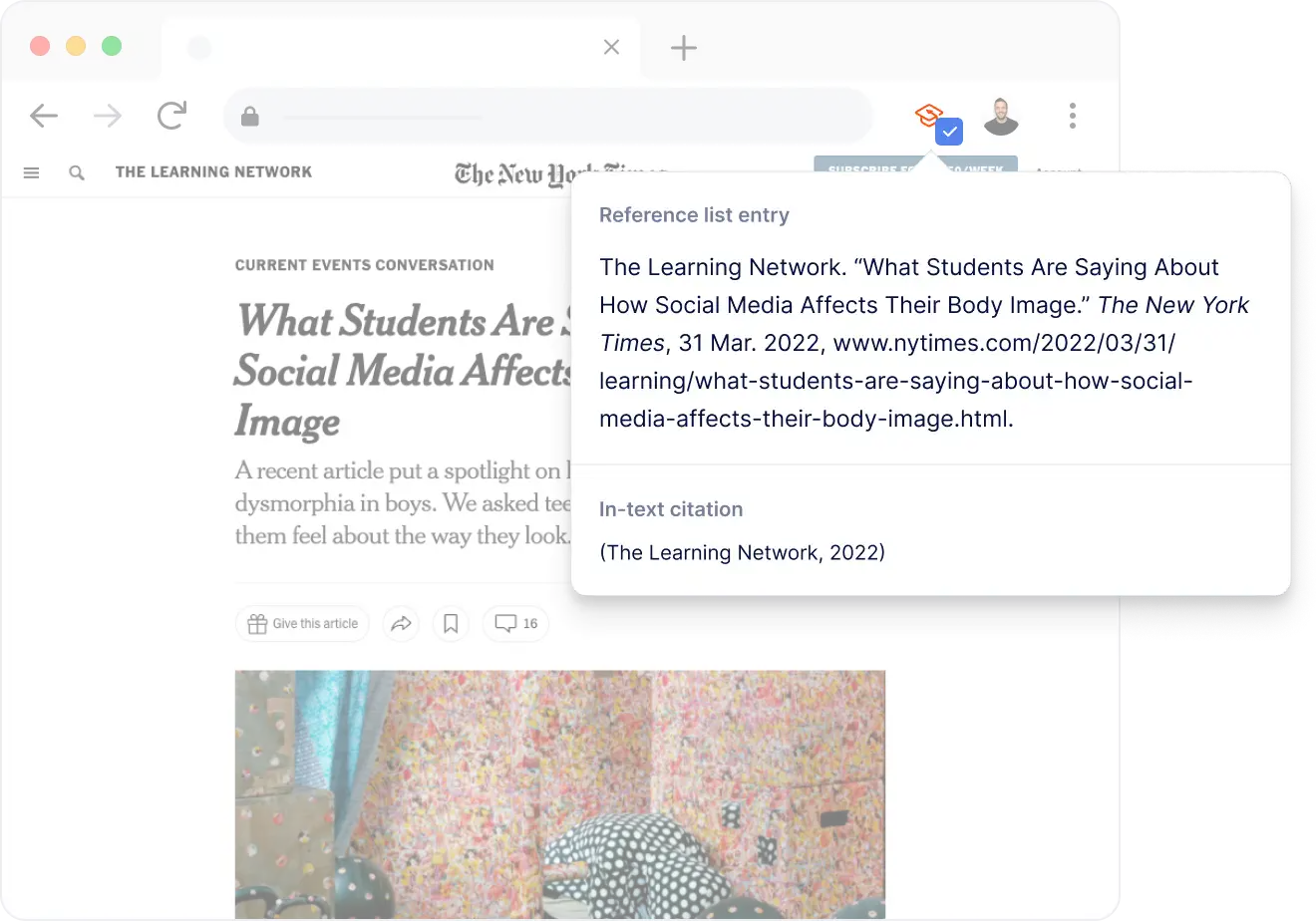Scribbr Citation Generator
Accurate APA, MLA, Chicago, and Harvard citations, verified by experts, trusted by millions

Scribbr for Chrome: Your shortcut to citations
Cite any page or article with a single click right from your browser. The extension does the hard work for you by automatically grabbing the title, author(s), publication date, and everything else needed to whip up the perfect citation.
Add to Chrome. It's free!| ⚙️ Styles | APA, MLA, Chicago, Harvard |
|---|---|
| 📚 Source types | Websites, books, articles |
| 🔎 Autocite | Search by title, URL, DOI, or ISBN |

Perfectly formatted references every time
Inaccurate citations can cost you points on your assignments, so our seasoned citation experts have invested countless hours in perfecting Scribbr’s citation generator algorithms. We’re proud to be recommended by teachers and universities worldwide.
Enjoy a citation generator without flashy ads
Staying focused is already difficult enough, so unlike other citation generators, Scribbr won’t slow you down with flashing banner ads and video pop-ups. That’s a promise!
Start citingCitation Generator features you'll love
Autocite
Look up your source by its title, URL, ISBN, or DOI, and let Scribbr find and fill in all the relevant information automatically.
APA, MLA, Chicago, and Harvard
Generate flawless citations according to the official APA, MLA, Chicago, Harvard style, or many other rules.
Export to Word
When your reference list is complete, export it to Word. We’ll apply the official formatting guidelines automatically.
Lists and folders
Create separate reference lists for each of your assignments to stay organized. You can also group related lists into folders.
Export to Bib(La)TeX
Are you using a LaTex editor like Overleaf? If so, you can easily export your references in Bib(La)TeX format with a single click.
Custom fonts
Change the typeface used for your reference list to match the rest of your document. Options include Times New Roman, Arial, and Calibri.
Industry-standard technology
Scribbr’s Citation Generator is built using the same citation software (CSL) as Mendeley and Zotero, but with an added layer for improved accuracy.
Annotations
Describe or evaluate your sources in annotations, and Scribbr will generate a perfectly formatted annotated bibliography.
Citation guides
Scribbr’s popular guides and videos will help you understand everything related to finding, evaluating, and citing sources.
Secure backup
Your work is saved automatically after every change and stored securely in your Scribbr account.
A quick guide to working with sources
Working with sources is an important skill that you’ll need throughout your academic career.
It includes knowing how to find relevant sources, assessing their authority and credibility, and understanding how to integrate sources into your work with proper referencing.
This quick guide will help you get started!
Finding relevant sources
Sources commonly used in academic writing include academic journals, scholarly books, websites, newspapers, and encyclopedias. There are three main places to look for such sources:
- Research databases: Databases can be general or subject-specific. To get started, check out this list of databases by academic discipline. Another good starting point is Google Scholar.
- Your institution’s library: Use your library’s database to narrow down your search using keywords to find relevant articles, books, and newspapers matching your topic.
- Other online resources: Consult popular online sources like websites, blogs, or Wikipedia to find background information. Be sure to carefully evaluate the credibility of those online sources.
When using academic databases or search engines, you can use Boolean operators to refine your results.
Scribbr Citation Generator
Generate APA, MLA, Chicago, and Harvard citations in seconds
Evaluating sources
In academic writing, your sources should be credible, up to date, and relevant to your research topic. Useful approaches to evaluating sources include the CRAAP test and lateral reading.
CRAAP test
CRAAP is an abbreviation that reminds you of a set of questions to ask yourself when evaluating information.
- Currency: Does the source reflect recent research?
- Relevance: Is the source related to your research topic?
- Authority: Is it a respected publication? Is the author an expert in their field?
- Accuracy: Does the source support its arguments and conclusions with evidence?
- Purpose: What is the author’s intention?
Lateral reading
Lateral reading means comparing your source to other sources. This allows you to:
- Verify evidence
- Contextualize information
- Find potential weaknesses
If a source is using methods or drawing conclusions that are incompatible with other research in its field, it may not be reliable.
Integrating sources into your work
Once you have found information that you want to include in your paper, signal phrases can help you to introduce it. Here are a few examples:
| Function | Example sentence | Signal words and phrases |
|---|---|---|
| Neutral: You present the author’s position neutrally, without any special emphasis. | According to recent research, food services are responsible for one-third of anthropogenic greenhouse gas emissions. | According to, analyzes, asks, describes, discusses, explains, in the words of, notes, observes, points out, reports, writes |
| Supportive: A position is taken in agreement with what came before. | Recent research has confirmed Einstein’s theory of general relativity by observing light from behind a black hole. | Agrees, confirms, endorses, reinforces, promotes, supports |
| Argumentative: A position is taken for or against something, with the implication that the debate is ongoing. | Allen Ginsberg denies the importance of artistic revision … | Argues, contends, denies, insists, maintains |
Following the signal phrase, you can choose to quote, paraphrase or summarize the source.
- Quoting: This means including the exact words of another source in your paper. The quoted text must be enclosed in quotation marks or (for longer quotes) presented as a block quote. Quote a source when the meaning is difficult to convey in different words or when you want to analyze the language itself.
- Paraphrasing: This means putting another person’s ideas into your own words. It allows you to integrate sources more smoothly into your text, maintaining a consistent voice. It also shows that you have understood the meaning of the source.
- Summarizing: This means giving an overview of the essential points of a source. Summaries should be much shorter than the original text. You should describe the key points in your own words and not quote from the original text.
Citing sources
Whenever you quote, paraphrase, or summarize a source, you must include a citation crediting the original author.
Citing your sources is important because it:
- Allows you to avoid plagiarism
- Establishes the credentials of your sources
- Backs up your arguments with evidence
- Allows your reader to verify the legitimacy of your conclusions
The most common citation styles are APA, MLA, and Chicago style. Each citation style has specific rules for formatting citations.
Scribbr Citation Generator
Generate APA, MLA, Chicago, and Harvard citations in seconds
Tools and resources
Scribbr offers tons of tools and resources to make working with sources easier and faster. Take a look at our top picks:
- Citation Generator: Automatically generate accurate references and in-text citations using Scribbr’s APA Citation Generator, MLA Citation Generator, Harvard Referencing Generator, and Chicago Citation Generator.
- Plagiarism Checker: Detect plagiarism in your paper using the most accurate Turnitin-powered plagiarism software available to students.
- AI Proofreader: Upload and improve unlimited documents and earn higher grades on your assignments. Try it for free!
- Paraphrasing tool: Avoid accidental plagiarism and make your text sound better.
- Grammar checker: Eliminate pesky spelling and grammar mistakes.
- Summarizer: Read more in less time. Distill lengthy and complex texts down to their key points.
- AI detector: Find out if your text was written with ChatGPT or any other AI writing tool. ChatGPT 2 & ChatGPT 3 supported.
- Proofreading services: Have a human editor improve your writing.
- Citation checker: Check your work for citation errors and missing citations.
- Knowledge Base: Explore hundreds of articles, bite-sized videos, time-saving templates, and handy checklists that guide you through the process of research, writing, and citation.
